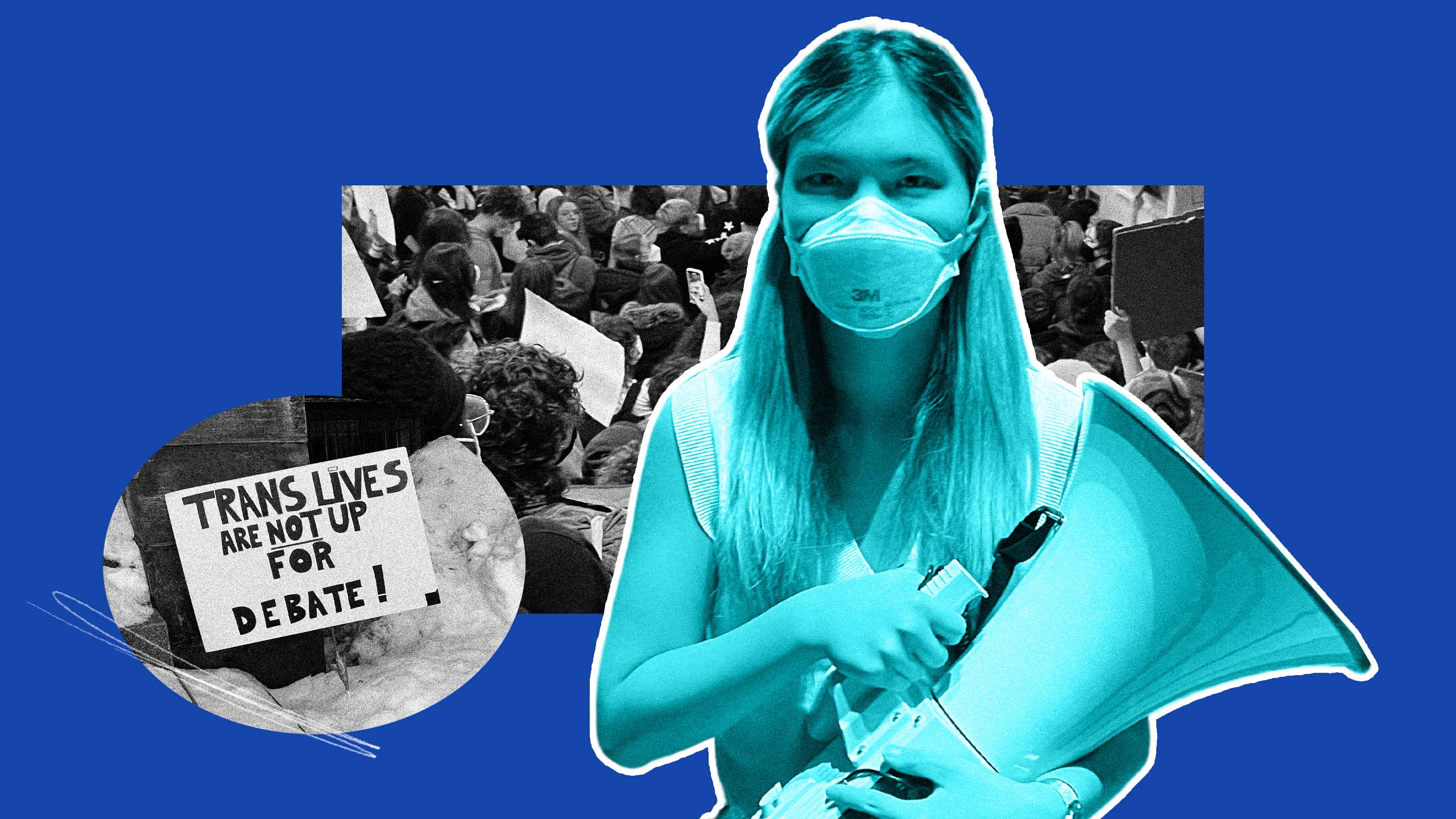On Jan. 10, trans rights advocates protested against McGill University for hosting Robert Wintemute, a member of the anti-trans group LGB Alliance. The event was cancelled partway through after protestors entered the venue and threw flour at Wintemute.
McGill University’s Centre for Human Rights & Legal Pluralism (CHRLP) hosted the event, “Sex vs. Gender (Identity) Debate in the United Kingdom and the Divorce of LGB from T.” Wintemute’s work as a lawyer inspired the formation of The LGB Alliance, a British group that advocates against the rights of trans people in the U.K. Wintemute argues that in women only spaces and within sports, a person’s birth sex takes precedence over their gender identity or legal sex.
Celeste Trianon is a 19-year-old trans activist and the lead organizer of the protest. She is studying law at Université de Montréal and is the coordinator of the Quebec Trans ID Clinic. In the past, she has helped organize protests against the passing of Quebec Bill 2, which would have required people to have undergone gender-affirming surgery before requesting a change of sex identification. She also developed Legal Transition Knowledge Base (LTKB), a resource designed to help trans people navigate the legal transition process in the province of Quebec. She organized the Trans March for Liberation during Pride Week in August 2022.
Xtra spoke with Trianon following the events of the protest.
How did you get involved in trans activism?
It was very much a cascade of events. It started off with just trying to avoid homelessness, that was kind of what brought me in in the first place. At the time, I was 16 and I was a trans youth having to fight for her home, almost her own life, in order to be able to have a roof. I started working with the Centre for Gender Advocacy, and was quickly put in charge of a major constitutional court case. I had to fight back against one of Canada’s transphobic bills —Quebec’s Bill 2, which at the time would have basically removed trans people’s ability to have their gender fully recognized without gender-affirming surgery. It was a major threat toward the community.
I feel like there’s a certain barrier to trans activism. I tried my best to avoid those barriers to really cement myself as a position of authority and do everything as necessary to make sure that the bill will not be passed, which was a success. I, then, subsequently helped lobbied the government too on other aspects, such as making sure gender marker changes were free, which was partially granted.
The recent protest at McGill University, where they hosted a transphobic lawyer for an event, is one of many instances of academia platforming transphobes and TERFs. Why is it so important to challenge academic institutions in how they are discussing trans issues currently?
I would say very clearly upfront that there are ways to respectfully debate different elements without contradicting trans people and how to make sure they have the best quality of life possible.
The thing with an event like McGill’s is that it solely contributes to sponsoring hate. It solely contributes to attacking trans people’s very own dignity, safety and even right to live. It’s not even a debate: on one end you have trans people’s very own existence and on the other end, you have a group who’s determined to erase, to exterminate trans people.
There’s a phenomenal amount of trans refugees and I believe this is only going to get worse if we keep on platforming hate. Canada, right now, is in a way a safe haven for trans people, despite all its right-wing politics. I think that’s something that exists and we cannot take that for granted. If Canada becomes an unsafe place [for] trans people, we will become a country where people have to flee in order to be able to live safely as trans people. Right now, people from the States from the U.K. and other so-called “first world” countries are fleeing over toward us because they see us as inclusive.
Are you still waiting to hear from McGill about the demands stated in the letter ?
McGill has sent out messages to its students, not to me specifically, and it has been frankly very disappointing. I just saw the response, they’re even calling the protesters violent. I think McGill is by trying to reverse the blame on to the protesters and is making a farce of itself because hate is violent by its very nature. We just want accountability, apologies and positive steps taken towards making sure that trans students and staff feel safe and making sure that the trans community does not suffer from the consequences of performing such hate.
How did organizing against McGill University compare to organizing against Bill 2?
In both cases, the fights were very similar. The Bill 2 one was definitely much more prolonged. In both cases, it was very urgent, quick organizing with lots of steps taken by multiple people and kind of creating a creature and unleashing it. I feel that so much activism cannot be done alone. At the end of the day, it’s going to go where the people want to go, there’s not really any way you can stop others from doing what they want. Hierarchical structures are not suited for direct organizing. It was very similar because of how much it led to massive mobilization and how people acted so quickly.
There’s no single recipe for any organizing for or creating a protest. It can come in all shapes and forms, it can be a march, it can be a protest, it can be indoors, it can be outdoors, it can involve the government, it can involve emailing different people. As a matter of factly, it can very much be a little bit of everything, I think the trick to be a good activist is to always be ready to improvise and always be ready to pace yourself in an appropriate manner that will enable you to have a good impact, where it mobilizes people and pushes institutions to listen.
There’s a lot of burnout among trans activists. How do you stay grounded, or how do you find support for yourself while doing this work?
It’s very much about choosing your battles, in a way, because there are always other people out there. I want to encourage other future trans activists out there to come out and it can start with just helping to co-organize or even volunteering for any given protest. Just know that there’s others around them for support.
What do you have planned for the future in terms of trans activism or activism more broadly?
I think, for me, it really depends on what happens next. Of course, I do not want to have to organize these protests. It’s disgusting how we even have to fight back, personally. In a perfect world, I would fight for trans people in a more positive way, and try to liberate them in many different senses, including the economic one—just help them live their best lives, for example, the annual Trans March in Montreal is now taking off, or new legal clinics I run. In a perfect world, I’d really focus on these positive actions and focus on what makes trans folks happy and make sure that they’re able to live their best lives in every sense possible. I just want to make sure they’re able to thrive in a way.
This interview has been edited for length and clarity.


 Why you can trust Xtra
Why you can trust Xtra


